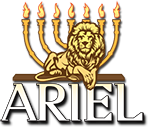Teaching

Let not many of you become teachers, my brethren, knowing that as such we will incur a stricter judgment. -James 3:1
At ARIEL, teaching is taken very seriously. Great care is given to speak only the truth to lead people to the pastures of the Scriptures, not necessarily to make strong conclusions, but to give food for thought which serves to whet our appetites for further study and consideration of what our Father might have us understand.
There are many teachings in the world today which claim to be based on the Scriptures. However, many teachers consider only the words and phrases as they are written in our modern translations, drawing broad-sweeping conclusions based only on a specific phrase. At ARIEL, we have discovered problems with this approach, especially since most of our modern translations have been written with certain pre-conceived doctrines in mind, and the translations often reflect a related agenda.
But how do we know what the Scriptures are saying, especially in areas that could be ambiguous? One way is to look at the original language in which a certain passage was written. Studying the original Hebrew words behind our translated texts often reveal that several different words could have been used, from which the translators chose, which often give drastically different meanings.

In the case of the New Covenant books, also referred to as the New Testament, the Apostolic Writings, or the Brit Chadashah (Renewed Covenant), most of the books we have today were translated from ancient Greek scripts which were likely translations themselves from lost versions in Aramaic (a language very similar to Hebrew). In this case, studying the Greek text can be helpful, but we have also found that almost every teaching in the Apostolic Writings actually refer to, or were based upon, original Hebrew concepts found in the Tanak, or Old Testament, or the Torah and Prophets.
In fact, one of the main criterium for canonizing a New Covenant book, or including it in what was to be the official Bible, was that the book did not, in any way, contradict the Tanak. Today, we can trace most of the Messiah’s teachings—as well as those of His disciples— to those in the Torah, and get a more complete understanding of a passage through specific references to ancient Hebrew concepts. Another good proof for any doctrine is that it is not drawn from only one verse or phrase but that is clearly confirmed in at least two distinct places in the Tanak, much like a testimony is not to be acted upon until it is confirmed by at least two witnesses.
While we cannot possibly claim to have a complete theology from what is constantly being revealed, we are continually learning, and we have found that studying the Scriptures from the perspective of the Torah makes even the most ambiguous passages come together in a way that makes complete sense and reveals the truths intended which are often quite different that what is taught by many denominations today.
ARIEL generally provides two teachings each week: a short Torah Portion in which the speaker shares insights on a particular concept from the weekly part of the Torah that is read and studied by millions of people around the world each week, and then a more in-depth Message about a topic that is on the heart of the teacher to share. Each week, both of these teachings are posted as audio recordings online, though there might only be one extended Message on the Feast Days:
Torah Portions Messages
In every teaching at ARIEL, we trust the Holy Spirit to speak that which is His will, and we are continually in awe at the amazing insights He reveals each week from His Word!




